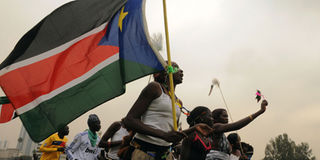South Sudan to launch new currency

AFP PHOTO/ SIMON MAINA
South Sudanese living in Kenya sing and dance on July 9, 2011 as they wave their countries flag during independence day celebrations on July 9, 2011.
JUBA
South Sudan will launch its new currency next Monday, just over a week after splitting from the north to become the world's newest nation, the country's Finance minister said on Monday.
"From the 18th onward, depending on the distribution process, that money will be out and people will go on receiving their salaries and doing any other business as usual," Finance Minister David Deng Athorbei said.
Athorbei said planes would start delivering consignments of South Sudan pounds to Juba from Wednesday and that the exchange rate with the former currency, the Sudanese pound, would be fixed at one to one.
He did not say how long it would take to completely phase out the old currency.
Athorbei said the government had faced problems paying salaries for June and July after Khartoum failed to deliver Sudanese pounds to Juba.
"This difficulty is related to the fact that the Khartoum government did not deliver us the physical cash," Athorbei said, adding salaries for July would now be paid in the new currency.
Meanwhile, South Sudan's President Salva Kiir on Monday appointed a caretaker cabinet ahead of an expected government shake-up later this year.
Kiir reinstated all the ministers from the former cabinet in the same positions in a temporary government for the newly independent state, in line with the constitution.
"I dissolved the cabinet yesterday and have reinstated you back to be caretakers until we form the new government," Kiir told ministers at a swearing-in ceremony.
After five decades of devastating conflict with the north, the fledgling country is one of the poorest on earth and faces a raft of daunting challenges as it begins the task of nation building.
The World Bank warned on Monday that, despite high expectations following Saturday's jubilant independence celebrations, it would take decades for South Sudan to become a fully functioning state, and urged the government to diversify its economy.
"We've found that countries that went through this post-conflict transition took about 20 years to have ministries that function more or less OK," the World Bank's acting country director Ian Bannon told reporters.
"Creating institutions is a very, very long process and takes an awful lot of perseverance."
Bannon said the country's government urgently needed to develop the agricultural sector to lessen the new nation's reliance on oil revenues, which account for more than 95 percent of its income.
"From the economic point of view we feel that it is very, very important that this country diversifies," he added.




